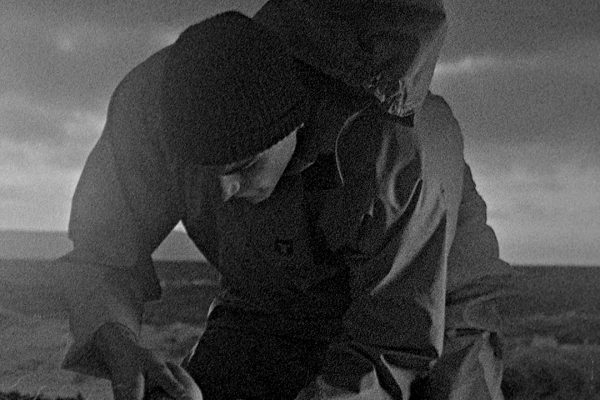As part of Edinburgh International Film Festival 2019
It probably says something about cinema today when a film that harks back nearly a hundred years feels revolutionary, but that’s the odd sensation cast by Mark Jenkin’s spellbinding, hypnotic melodrama. Shot on a vintage Bolex 16mm camera, Jenkin has artificially aged his black and white print so the screen fizzes and pops like the visual equivalent of a vinyl record. The effect is a strange union down the decades of Sergei Eisenstein and Mike Leigh.
Martin (Edward Rowe) is a Cornish fisherman missing a boat. Due to the decline of the industry, his brother Steven (Giles King) has repurposed their vessel for another means of income; sightseeing cruises for tourists and stag weekends. As Martin trudges to the beach each morning armed with nets and lobster pots, he nurses his resentment at his brother and the influx of London money to which he feels his community has prostituted itself. He seethes in particular at the Leigh family (Simon Shepherd and Mary Woodvine) who have bought an entire street on the harbour front, including Martin’s childhood home.
Bait is a masterclass in the use of editing to create mood. Jenkin uses the montage techniques pioneered by Eisenstein in the likes of Strike and, of course, Battleship Potemkin to manipulate our sympathies and establish a feverish undercurrent of dread that tugs at the ankles with sinister invitation. He lingers on knots being tied, fish untangled from nets and buoys banging against the side of boats; a fetishisation of the tools, trade and traditions of the area. These are intercut with a propagandist’s eye against the arrival of 4x4s, plummy voiced tourists complaining of the long drive, and fridges being filled with champagne. Framed in the jittery black and white, these interlopers and their modernity are new, alien and monstrous.
Early in the film, Martin is aghast at the changes made to his former home, now kitchily christened Skipper’s Cottage. “Ropes and chains like a sex dungeon,” he grumbles, dismayed that the tools of his trade now hang as decoration from the walls, made laughable and tasteless when removed from the context of their utility. He withdraws to feed his insatiable grievances some more. Local Hero this most certainly is not.
Such is the blanketing fog of atmosphere, Jenkin is able to keep us guessing through the simple narrative. Are we getting a revenger’s tragedy, a folk horror, a lo-fi Straw Dogs? The antipathy between the poor locals and the rich invaders gradually increases, Martin’s brow becomes ever more furrowed, and Bait becomes ever more a siren song. The kinetic crackles and scratches of the print add to the tension.
Jenkin’s expressionist techniques and willingness to experiment do mask a few sins. Some of the performance are stiffer than a wooden leg to say the least, though this does add to the gruff taciturnity exuded by the locals. The revulsion at gentrification is also in danger of becoming not just parodically NIMBY-ish, but actively atavistic. You do suspect that, underneath the surface level, Jenkin is making a deeper point about the ease with which an audience can be manipulated and the willingness with which they surrender to it.
That’s the Iago-like genius of Bait (a simple title containing multitudes). Knowing full well the techniques Jenkin has at his disposal, it’s still impossible not to be swept along. There may be ‘better’ films at EIFF this year, but it’s doubtful that any will connect on such a primal level.
UK Premiere screenings at Odeon Edinburgh Fri 21 and Sun 23 Jun 2019
